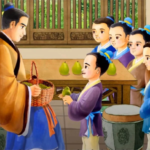In ancient times, organizing a funeral was held in high regard. For the deceased, preparing a funeral for them cannot be ignored or done in a haphazard manner. In this context, a proverb has become popular among the people: “When rain falls on the grave, a noble person appears; when rain falls on the coffin, the wealthy person disappears.”
This saying is not just a simple metaphor about natural phenomena, but also contains deep meanings about ethics and family ties.
What does this saying mean?
According to tradition, burial is seen as the final act to show respect and gratitude to ancestors, the deceased.
The proverb “When rain falls on the grave, a noble person appears” indicates that after the funeral ends, when it starts to rain and rainwater falls on the grave, it is considered an expression of sympathy from the heavens. This shows the favor of heaven towards the descendants of the deceased, bringing them wealth and prosperity in the future.
On the other hand, “When rain falls on the coffin, the wealthy person disappears” signifies that in a funeral, if it rains and rainwater falls on the coffin, it is considered a bad omen.

On the other hand, “When rain falls on the coffin, the wealthy person disappears” signifies that in a funeral, if it rains and rainwater falls on the coffin, it is considered a bad omen.
The concept of “filial piety” in modern society
According to the thinking of the ancients, this phenomenon symbolizes something unfavorable. When rainwater wets the coffin in a funeral, people believe that it is a sign that the future life of loved ones will be filled with risks, difficulties, and poverty.
According to tradition, burial is seen as the final act to show respect and gratitude to ancestors, the deceased. The proverb “When rain falls on the grave, a noble person appears” implies that after the funeral ends and it starts to rain, when rainwater falls on the grave, it is seen as an expression of sympathy from the heavens. This shows the favor of heaven towards the descendants of the deceased, bringing them wealth and prosperity in the future.

According to tradition, burial is seen as the final act to show respect and gratitude to ancestors, the deceased.
On the contrary, “When rain falls on the coffin, the wealthy person disappears” implies that in a funeral, if it rains and rainwater falls on the coffin, it is considered a bad omen. According to the thinking of the ancients, this phenomenon symbolizes something unfortunate. When rainwater wets the coffin in a funeral, people believe that it is a sign that the future life of loved ones will be filled with obstacles, difficulties, and poverty.
The concept of “filial piety” in modern society
In today’s society, the traditional value of filial piety still holds strong and is considered an important principle shaping every action and decision of individuals. The advice from ancestors is not limited to funeral arrangements but also lies in how we care for and express affection to our family on a daily basis.
The proverb “When rain falls on the grave, a noble person appears; when rain falls on the coffin, the wealthy person disappears” serves as a reminder of the importance of preserving and developing the value of “filial piety” within the family, thereby contributing to building a warm, morally rich, and compassionate society.
Living filial piety through the smallest acts
Filial piety is not only expressed through funeral arrangements but also through small actions in everyday life, such as caring, nurturing, and spending time with parents. Simple acts of care and concern, like a family meal, a hug, or a visit, are enough to show gratitude and respect to those who have sacrificed and taken care of us.
In conclusion, the aforementioned proverb emphasizes not only the moral value of “filial piety” but also serves as a lesson in expressing emotions and responsibilities towards family, in all circumstances. Every action, no matter how small, can contribute to maintaining and developing this good value, helping to build a warm and loving society.



































